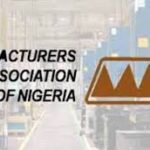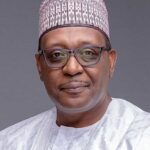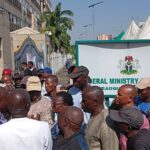The National Automotive Design and Development Council (NADDC) is taking further strides toward enabling an environment where Nigeria can build capacity to promote local automotive development.
This is just as the Director General of the NADDC, Jelani Aliyu, early this month visited some automotive plants together with the Nigerian Ambassador to Japan, Husaini Moriki, and Chairman House Committee on Industry, Dr Enitan Badru.
Dilemma as agencies take over sale of FG’s recovered assets
Gunmen abduct 2 APC chieftains, kill 3 in Imo
The Nigerian contingent met with the key Japanese automotive manufacturers in Tokyo, Yokohama, Hamamatsu and Iwata, Japan. They are Toyota, Honda, Nissan, Mitsubishi, Isuzu, Suzuki and Yamaha.
NADDC was formed by Act no. 83 of 30th May 2014 from the merger of the National Automotive Council and the Centre for Automotive Design and Development as a parastatal of the Federal Ministry of Industry, Trade and Investment. It is vested with the role of creating an enabling environment for the manufacture of Nigerian-made vehicles of international standards at competitive prices using local human and material resources.
According to a report of the tour, the discussions focused on achieving bigger investments by these international companies to set up mega production and assembly plants in Nigeria.
Some of the companies, as a result of the implementation of the NAIDP (the National Automotive Industry Development Plan, by the NADDC), are already building vehicles in Nigeria: Honda West Africa, Nissan/Stallion, Toyota/Elizade, Mitsubishi/CFAO, Suzuki/Boulos, Isuzu/Kewalrams and Yamaha/CFAO.
Aliyu’s call for larger investments to produce even more vehicles comes at a time when the need for diversification in Nigeria is paramount to the country’s economy as the population continues to grow. Besides, the Africa Continental Free Trade Area (AfCFTA) is also opening up Africa-wide opportunities for Nigerian Automotive manufacturers.
Aliyu explained that the discussions with the companies were very fruitful, with strong potential for the various manufacturers to significantly increase their operations and market footprint in Nigeria and contribute at an even higher level to the growth and sustainability of the Nigerian Automotive space.
The Nigerian Ambassador to Japan, Husaini Moriki, urged the Japanese companies to identify areas of focus that the companies would like the Nigerian government to work towards delivering a better business environment, especially now that the NAIDP and the Auto Policy are being reviewed by the NADDC.
The Ambassador further commended the Director General on reviving the Nigerian Automotive industry and urged the Japanese companies to collaborate with the NADDC in training and upskilling Nigerian youth at the 18 Automotive Training Centres built by the agency across the country, using state-of-the-art training equipment and modules.
Aliyu mentioned that the NADDC has engaged the international firm KPMG to support it in the review process of the Auto Policy so as to develop it with more efficacy in regard to the current pattern of global and regional automotive production and distribution.
The council said KPMG is getting support from the African Association of Automotive Manufacturers (AAAM. “As soon as the draft policy is done by KPMG, it shall go as an executive bill to the National Assembly. The Senate and House Committees on Industry are giving their full support towards having this reviewed policy be backed by a legal framework,” said Aliyu.
The Chairman, House Committee on Industry, Dr Enitan Badru, discussed the importance of legislative support to the new Auto Policy so that it gives the investors the confidence and stability to invest in Nigeria. He also stressed the importance of the vehicle finance scheme for the purchase of those locally produced vehicles.
Aliyu highlighted some of the draft key areas of the reviewed policy, aimed at further boosting the financial advantages of local production/assembly: clear import duty differential between locally assembled vehicles and those imported fully built, tax waivers, dedicated customs corridors/services, provision of single digit capital financing for both manufacturers and buyers, mandatory government patronage, all in favour of local production/assembly.
Aliyu reiterated that the meeting presented the opportunity to get input from the multinational corporations so that the reviewed Auto Policy would clearly address concerns and requirements to make Nigeria a viable destination for investment as per the modern pattern of global automotive production, and components sourcing and finished product distribution.
Still in its collaborative bid, the NADDC head recently at the launch of AFRICAR in Ibadan, Oyo State, pledged commitment to supporting local automotive firms to promote modern logistics.
AFRICAR is a modern ride-hailing service with dedicated vehicles which are built in Lagos, Nigeria by the Stallion Group.
Aliyu further said the objective of the Federal Government is that Nigeria becomes a hub for automotive manufacturing technology in Africa. In order to achieve this objective, the private sector has to play a pivotal role as the government provides an enabling environment, the launching of “AFRICAR” which is of international standards is, therefore, a step in the right direction.
He added that over the years, the Council has worked tirelessly to ensure the survival and growth of the Nigerian Automotive Industry, with a view to enhancing the industry’s contribution to the national economy.
The newly introduced mode of transportation will enhance basic mobility for all, including visitors, easing mobility for students, workers and communities from various suburban areas to the city centre.
Speaking at the event, the CEO of AFRICAR, Mr Sahil Vaswani, said all the cars being used for the project are assembled in Lagos at the Stallion Group’s VON Plant.
He said AFRICAR, in partnership with the National Automotive Design and Development Council (NADDC), has developed the Bajaj Qute cars used for the new ride-hailing taxi.
“This car is assembled in Nigeria by Nigerians and is environmentally friendly, with 50 per cent lower carbon emissions than the average car,” he said.

 Join Daily Trust WhatsApp Community For Quick Access To News and Happenings Around You.
Join Daily Trust WhatsApp Community For Quick Access To News and Happenings Around You.

